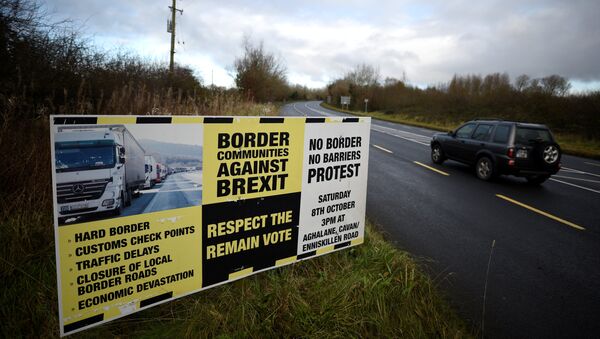According to UK Brexit Secretary David Davis, Britain intends to prevent a hard border in Ireland after leaving the EU regardless of the outcome of the negotiations with the bloc.
Speaking about a vow on the Irish border, he said that it is rather ""a statement of intent," adding "Of course it's legally enforceable, under the withdrawal agreement, but even if that didn't for some reason, if something went wrong, we would still be seeking to provide a frictionless, invisible border."
Davis has recently sparked reaction from the Irish government, after he said the recently struck divorce agreement between London and Brussels was a "statement of intent" rather than "legally enforceable."
Davis told the BBC on Sunday that the agreement published on Friday might not be enacted if there was no free trade deal between the two sides, challenging progress on the Irish border issue.
Ireland responded that the deal was "binding" and it would hold Britain accountable.
"Both Ireland and the EU will be holding the UK to the phase one agreement," the Irish government warned in a statement, as cited by The Guardian.
Prime Minister Leo Varadkar stressed that the deal was "politically bulletproof" and "cast iron."
"We will as a government, a sovereign government in Ireland, be holding the United Kingdom to account, as will the European Union. … This, as far as we're concerned, is a binding agreement, an agreement in principle," the Irish government’s chief whip, Joe McHugh told the RTE broadcaster, adding that Davis’ comments were "bizarre."
On Friday, the UK and the EU hammered out a last-minute deal on the key issues of Brexit after nearly six months of negotiations.
READ MORE: UK Presents EU With Non-Binding Post-Brexit Trade Deal
In particular, the deal envisages no "hard border" between Northern Ireland and the Republic of Ireland. EU citizens in the UK, and UK citizens in the EU, will also see their rights protected.
The deal is likely to result in allowing the talks to move on to a future trade deal.
The Brexit talks between London and Brussels kicked off on June 19. Negotiations between the UK and EU about the transition period will start in January, whilst the trade deal discussions will commence in February or March.
In a referendum on June 23, 2016, about 51.9 percent of British voters said "yes" to their country leaving the EU.



